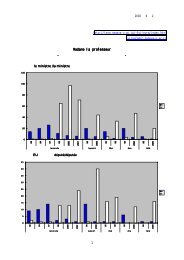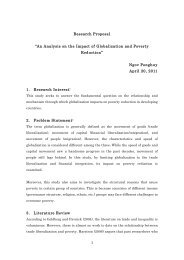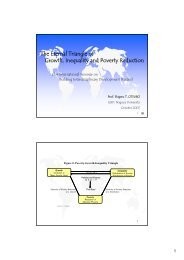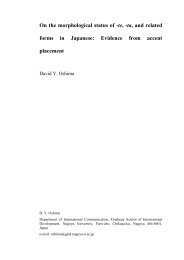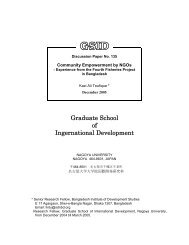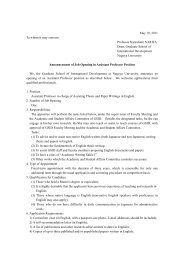Report
Report
Report
Create successful ePaper yourself
Turn your PDF publications into a flip-book with our unique Google optimized e-Paper software.
T OURISM AND TRAVEL RELATED SERVICES 127<br />
national treatment will not be accorded with respect<br />
to foreign exchange provided to foreigners to pay for<br />
any cross-border services. Thus for the tourism services<br />
provided by foreigners via Mode 1 while paying foreign<br />
exchange national treatment is not guaranteed. This<br />
implies that there could be discrimination between<br />
national and foreigners while payment is made in<br />
foreign exchange for services rendered through Mode<br />
1. However, those categories of persons have been<br />
excluded who are covered by Nepal’s commitments.<br />
Incidentally, there are only a few categories of persons<br />
who are covered by the schedule of commitments.<br />
Under Mode 3 in the National Treatment column<br />
a foreign investor reinvesting earnings is required to<br />
obtain the permission of the department of industry.<br />
Further, all foreign investments except for financial<br />
services require approval by the department of industry.<br />
Besides, incentives and subsidies are available only to<br />
enterprises wholly owned by Nepalese nationals.<br />
The tourism sector is largely dependent on various<br />
other sectors. In this regard, the most important sector<br />
is air transport without which the existence of today’s<br />
tourism would be extremely difficult. However, the air<br />
transport is only partially covered by GATS. According<br />
to Paragraph 3 of the Annex on Air Transport Services,<br />
only three services related to air transport – aircraft<br />
repair and maintenance services; the selling and<br />
marketing of air transport services; and computer<br />
reservation system (CRS) services are covered by GATS<br />
and services related to traffic rights which are the main<br />
activities in air transport remain outside GATS. The<br />
partial coverage of the sector does not really favour<br />
developing countries as the sector is dominated by<br />
innumerable bilateral agreements dictated generally by<br />
advanced countries. Generally speaking, for developing<br />
countries a multilateral agreement is preferable to a<br />
bilateral one since their concerns could be better<br />
addressed when there are a large number of parties<br />
involved rather than the bilaterals where a strong party<br />
can always thrust its will over the weak counterpart.<br />
In this regard, the review of air transport services<br />
is an important exercise in the WTO. Nevertheless, a<br />
few peripheral services covered by the GATS – which<br />
are actually support services to air transport – have<br />
not been liberally committed by member countries.<br />
Thus it is not surprising that barring Nepal no other<br />
South Asian WTO member country has made any<br />
commitments in services related to air transport. Nepal’s<br />
commitments relate to maintenance and repair of<br />
aircraft (CPC 8868) and there are no restrictions in<br />
Modes 1 and 2. Under Mode 3 the commercial presence<br />
is allowed through incorporation in Nepal and with a<br />
maximum foreign equity capital of 51%. However,<br />
foreign equity cap will be increased to 80% after five<br />
years from the date of accession. In the National<br />
Treatment column, Modes 1, 2, and 3 are without any<br />
restrictions. Mode 4 is unbound under both Market<br />
Access and National Treatment columns and refers to<br />
the horizontal section where there is nothing specific<br />
for this sector.<br />
Tourism accounts for about one-third of Nepal’s<br />
services receipts. SAARC countries offer a very healthy<br />
market to Nepal tourism – India being the biggest<br />
market for Nepal in the region. However, Nepal tourism<br />
has witnessed little growth during 1995–2005. Thus,<br />
number of tourist arrivals has been almost stagnant<br />
during the past eleven years.<br />
Tourism plays a very important role in the economy<br />
of Nepal. Employing some 600,000 people, it is the<br />
second largest sector of employment after agriculture<br />
(UNCTAD-ICC 2004). It is also a prominent foreignexchange<br />
earner, contributing 21% of the total value<br />
of merchandise exports, 10% of total foreign exchange<br />
earnings and 3% of the country’s GDP. The economic<br />
importance of tourism in Nepal has been due to<br />
economic linkages, foreign exchange earnings,<br />
employment and improved socio-economic conditions<br />
in remote rural areas (ESCAP 2005). As tourism in<br />
Nepal has hitherto been concentrated in the Kathmandu<br />
valley, Pokhara and Chitwan, it has been suggested that<br />
new areas can be developed in other parts of the country<br />
by setting up resorts that can be destinations on their<br />
own, such as the national parks and wild-life reserves<br />
(UNCTAD-ICC 2004). The Nepal Tourism Board has<br />
been providing small-scale skill development training<br />
covering most areas of the tourism industry for local<br />
stakeholders to strengthen their capacity (ESCAP<br />
2005). The government has established the Nepal<br />
Academy of Tourism and Hotel Management and there<br />
are four private sector training institutes in Kathmandu<br />
and two in Pokhara.<br />
The major tourist-originating market for Nepal has<br />
traditionally been India, which account for nearly 20%<br />
of the total arrivals. This is a foundation that can be<br />
built on, for Indian tourists are among the highest<br />
spenders in Nepal and they are especially likely to visit<br />
in the summer months when non-Indian arrivals<br />
decline. The latest development in this area is the status<br />
granted to Nepal by the People’s Republic of China as<br />
one of the outbound destinations for Chinese tourists.<br />
According to the UNCTAD-ICC study, Tourism is<br />
an area with enormous potential. There are spectacular






